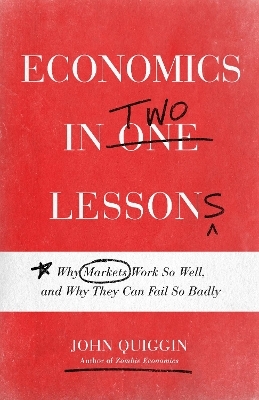
Economics in Two Lessons
Why Markets Work So Well, and Why They Can Fail So Badly
Seiten
2019
Princeton University Press (Verlag)
978-0-691-15494-7 (ISBN)
Princeton University Press (Verlag)
978-0-691-15494-7 (ISBN)
A masterful introduction to the key ideas behind the successes-and failures-of free-market economicsSince 1946, Henry Hazlitt's bestselling Economics in One Lesson has popularized the belief that economics can be boiled down to one simple lesson: market prices represent the true cost of everything. But one-lesson economics tells only half the s
A masterful introduction to the key ideas behind the successes—and failures—of free-market economics
Since 1946, Henry Hazlitt’s bestselling Economics in One Lesson has popularized the belief that economics can be boiled down to one simple lesson: market prices represent the true cost of everything. But one-lesson economics tells only half the story. It can explain why markets often work so well, but it can’t explain why they often fail so badly—or what we should do when they stumble. As Nobel Prize–winning economist Paul Samuelson quipped, “When someone preaches ‘Economics in one lesson,’ I advise: Go back for the second lesson.” In Economics in Two Lessons, John Quiggin teaches both lessons, offering a masterful introduction to the key ideas behind the successes—and failures—of free markets.
Economics in Two Lessons explains why market prices often fail to reflect the full cost of our choices to society as a whole. For example, every time we drive a car, fly in a plane, or flick a light switch, we contribute to global warming. But, in the absence of a price on carbon emissions, the costs of our actions are borne by everyone else. In such cases, government action is needed to achieve better outcomes.
Two-lesson economics means giving up the dogmatism of laissez-faire as well as the reflexive assumption that any economic problem can be solved by government action, since the right answer often involves a mixture of market forces and government policy. But the payoff is huge: understanding how markets actually work—and what to do when they don’t.
Brilliantly accessible, Economics in Two Lessons unlocks the essential issues at the heart of any economic question.
A masterful introduction to the key ideas behind the successes—and failures—of free-market economics
Since 1946, Henry Hazlitt’s bestselling Economics in One Lesson has popularized the belief that economics can be boiled down to one simple lesson: market prices represent the true cost of everything. But one-lesson economics tells only half the story. It can explain why markets often work so well, but it can’t explain why they often fail so badly—or what we should do when they stumble. As Nobel Prize–winning economist Paul Samuelson quipped, “When someone preaches ‘Economics in one lesson,’ I advise: Go back for the second lesson.” In Economics in Two Lessons, John Quiggin teaches both lessons, offering a masterful introduction to the key ideas behind the successes—and failures—of free markets.
Economics in Two Lessons explains why market prices often fail to reflect the full cost of our choices to society as a whole. For example, every time we drive a car, fly in a plane, or flick a light switch, we contribute to global warming. But, in the absence of a price on carbon emissions, the costs of our actions are borne by everyone else. In such cases, government action is needed to achieve better outcomes.
Two-lesson economics means giving up the dogmatism of laissez-faire as well as the reflexive assumption that any economic problem can be solved by government action, since the right answer often involves a mixture of market forces and government policy. But the payoff is huge: understanding how markets actually work—and what to do when they don’t.
Brilliantly accessible, Economics in Two Lessons unlocks the essential issues at the heart of any economic question.
John Quiggin is the President’s Senior Fellow in Economics at the University of Queensland in Brisbane, Australia. His previous book, Zombie Economics: How Dead Ideas Still Walk among Us (Princeton), has been translated into eight languages. He has written for the New York Times and the Economist, among other publications, and is a frequent blogger for Crooked Timber and on his own website: www.johnquiggin.com. Twitter @JohnQuiggin
| Zusatzinfo | 6 b&w illus. 4 tables. |
|---|---|
| Verlagsort | New Jersey |
| Sprache | englisch |
| Maße | 140 x 216 mm |
| Themenwelt | Sonstiges |
| Wirtschaft ► Allgemeines / Lexika | |
| Wirtschaft ► Volkswirtschaftslehre ► Makroökonomie | |
| ISBN-10 | 0-691-15494-5 / 0691154945 |
| ISBN-13 | 978-0-691-15494-7 / 9780691154947 |
| Zustand | Neuware |
| Informationen gemäß Produktsicherheitsverordnung (GPSR) | |
| Haben Sie eine Frage zum Produkt? |
Mehr entdecken
aus dem Bereich
aus dem Bereich
Volkswirtschaftslehre für eine sich ändernde Welt
Buch | Hardcover (2024)
De Gruyter Oldenbourg (Verlag)
CHF 62,90
Kompakt und prüfungsrelevant für Wirtschaftswissenschaftler
Buch | Softcover (2021)
Vahlen, Franz (Verlag)
CHF 16,65
Makroökonomie, Wirtschaftspolitik und nachhaltige Entwicklung
Buch | Hardcover (2022)
Vahlen (Verlag)
CHF 69,70


